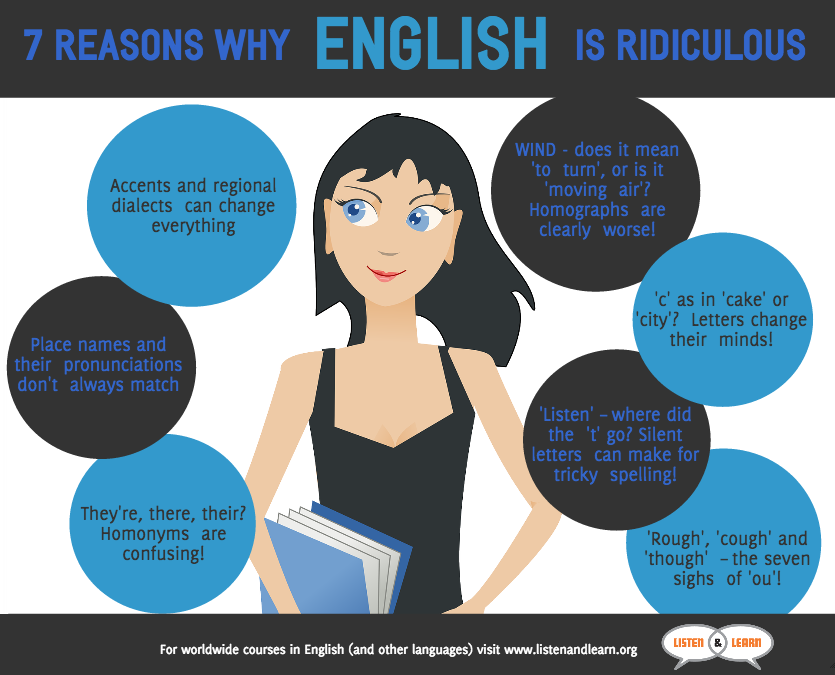Why the English Language is Ridiculous
We have a confession to make…
There are many mock worthy, bewildering things in this world related to pronunciation in the English language, words such as ‘subtle’ and ‘draught’. The way one letter is pronounced one way at the beginning of a word but differently in the middle or at the end. The way that depending on where you’re from, the way a word is said varies, and the way some letters suddenly get all shy and silent when made to play with other letters. It is no wonder English language learners feel defeated or ready to stab a glottal stop where it hurts. No wonder at all.
Take the word foible. The letters oi are always, always pronounced oi. Unless, of course, they are in a continuous tense (doing, going). Or slaughtering cattle in the abattoir. Or soothing skin with benzoin. Exception to every rule. We’re very sorry about that.
To prove how sorry we are, here are some further examples of where we know how ridiculous our language can be. It’s like we’re showing you our scars here so please, be gentle. No laughing. At least not out loud.
Phonological change
Phonology is a tricky beast and with the huge variation in accents and regional dialects, it is a wonder English learners don’t give up when they hear Andrew Lincoln switch from Mark in Love Actually to Rick Grimes in The Walking Dead. And you barely have to go 200 miles north of London for words to start behaving peculiarly. The word bath sets off on its journey sounding like the a is having a tooth extracted without anaesthetic, and ends like it is about to indulge in some Bisto on its Sunday lunch. This often happens with the joy of leaving London but perhaps Londoners will disagree.
Place name pronunciation that just doesn’t match up.
We promise, even for people from England, sometimes the way a place name is pronounced versus its spelling is alien even to us. Typical tripper-uppers are Gloucester, Keswick and Ruislip, contributing to many a family row on car journeys.
Homonyms
There are so many words in the English language that look about as different as chalk and cheese but when you sample them they spit out just the same. These are the deceptive homonyms, and typical examples are ‘to’, ‘too’ and ‘two’, and ‘there’, ‘they’re’ and ‘their’. Homonyms represent a huge stumbling block for English language learners and we have no explanation for them, only apologies.
Homographs
Perhaps these little fiends are a worse culprit to lead the learner astray than homonyms, because how on earth do you tell what they are trying to tell you if you can’t figure out what they mean? Homographs are sneaky little tripwires there to make even the most thorough of learners stumble on their path to English mastery. How are you supposed to know if you are being lead by a dance partner or about to be hit over the head by a lead object?
Cake!
Ok. So cake in itself is a beautiful thing and works in any language and on any tongue. But, look at the pronunciation. It sounds like it should be spelt ‘kake’ but in this word the beginning ‘c’ is masquerading as a ‘k’. Such confusion is not only for non-native language learners: in infant schools up and down the fair country of England, small people are taught to tell the difference between ‘curly c’ and ‘kicking k’.
Words with nothing to say.
Sometimes letters are forthright and proud and happily voicing their worth. Other times, however, letters become silent, sort of like they have unrequited feelings for the letter they’re stood next to and this has made them lose the ability to speak. K is a typical culprit of this in words like ‘knight’ and ‘known’, but p is also a little shy when written next to n (pneumonia) and s (psychiatry).
The 7 sighs of ‘oh’.
It’s tough when you’ve got a cough; you ought to persevere and work through it. We apologise for our lack of bedside manner. However, the letters ough when brought together behave very differently depending on their company. What are they trying to prove?
Table of Contents
***
There are so many more examples but we’re feeling a little exposed. English learners, we know our pronunciation is like that awkward relative that is forced upon us at family occasions. Annoying, hard to get along with, contrary. But we promise, sometimes, they have their uses. In this case, travel and job prospects. If the linguist in you is interested you can look at this phonemic chart for more pronunciation tips. And if the polyglot in you is hungry for more, why not check out what language courses we have on offer for you?



